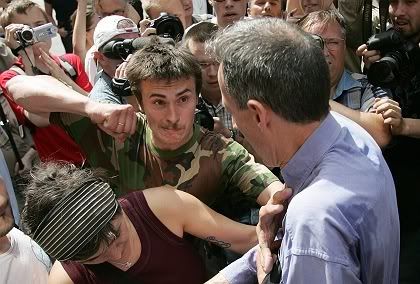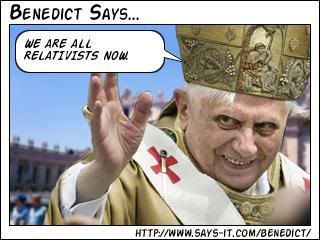Beating up gays: it's what Jesus would do
Across much of the former Soviet empire, gay rights are one of the main battlegrounds of the struggle between liberty and authoritarianism. Hungary and the Czech Republic are two rare examples of ex-communist states that have made the transition from tyranny to democracy and, in large measure, embraced gay human rights. In Russia, Latvia, Poland, Belarus, Lithuania and Moldova, however, the situation is very different. Freedom of expression and the rights of sexual minorities are still hedged with restrictions. In these countries, unreconstructed puritan communists have joined forces with ultra-nationalists, neo-Nazis and religious fundamentalists to orchestrate a homophobic backlash against the claims of their lesbian and gay citizens for equal rights and non-discrimination. The issue that has ignited this backlash is the refusal of gay people to remain in the shadows, invisible and ashamed. Their out and proud claim on public space and for the right to protest has prompted the banning of Gay Pride marches, from Riga in the west to Moscow in the east. These bans are much more than an attack on gay and lesbian people. They are a full-scale resistance to moves towards modernity, tolerance, progress and human rights. Gay people are the target and symbol. But it is freedom of expression itself, and the right to dissent, that is being quashed. 
The man in the photo above about to throw a punch at gay rights activist Peter Tatchell is, like those in crowd around him, an Orthodox Christian. He has turned up to protest against a small demonstration by gay rights activists--who are themselves peacefully protesting against the refusal of the Mayor of Moscow to allow a gay rights march--and he chooses to express his faith by beating up a man who has not threatened him in any way, and whose only crime appears to be that he is gay. Tatchell's assailant is motivated by faith-based hatred. And what I would like to know is this--what does he hate more: the "sin," or the "sinner?" Because it's really difficult to tell from the picture.
Regarding the bashings, it is only fair to point out that Orthodox Christians were not alone among the perpetrators--neo-Nazis and nationalists were also involved. Mindless homophobia makes for some interesting alliances. (And the Moscow police never lifted a finger against the homophobes, and instead threw their victims into jail. State-sponsored Christofascism.)
It is also only fair to point out that homosexuals have never really fared well in Russia: pre-revolutionary socialists saw them as symbols of capitalist decadence; and in the Soviet Union, homosexuals faced five years hard labour and mandatory "reparative therapy" (a technique favoured, incidentally, by many a god-fearing, bible-believing Christian in America). The post-Soviet era merely witnessed the replacement of one state church, Communism, with another: Orthodoxy; consequently, it has witnessed the replacement of an ideological justification for homophobia with a theological justification.
Unfortunately, as Tatchell himself notes in a recent Guardian piece, these events are not unique to Moscow:
All this nastiness, of course, has to be seen in the context of the war on secularism being waged by Europe's religious leaders, particularly Pope Benedict. According to an op-ed in the International Herald Tribune,Benedict's religious alternative is not some form of theocratic absolutism. On the contrary, the Pope is a staunch defender of secularity — the separation of church and state. Benedict wants to disentangle the church from the state, but without divorcing religion from politics, because only a religion freed from subservience to the state can save modern culture from itself.
Evidently, "saving modern culture from itself" involves re-asserting Bronze Age views on sexuality and fostering a society in which people have to live in fear because of their sexual orientation.
See also: Dispatches from the Culture Wars and Lines from a Floating Life.

















|